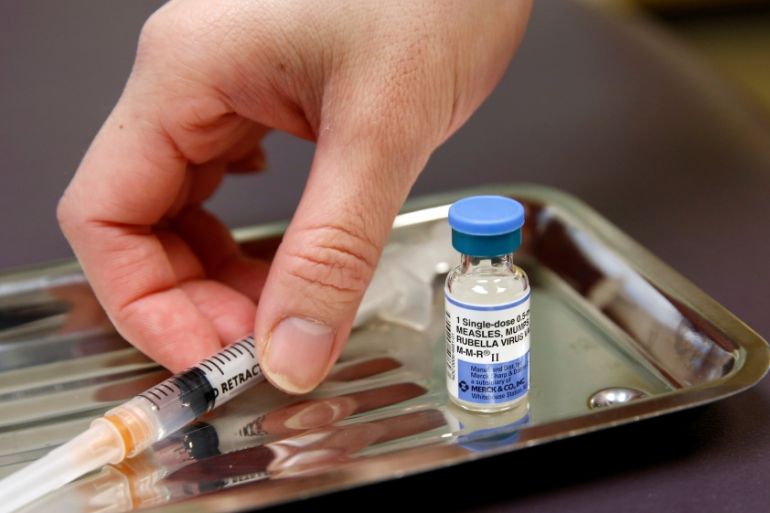Four European countries stripped of ‘measles-free’ status: WHO
Disease no longer considered eliminated in UK, Greece, the Czech Republic and Albania as WHO warns of spike in cases.

Measles cases are surging in Europe and have been reported in four countries previously considered to have eliminated it, including the United Kingdom, the World Health Organization (WHO) has warned.
Urging the European countries to step up vaccination efforts, the WHO on Thursday said based on the 2018 data, measles is no longer considered eradicated in the UK, Greece, the Czech Republic and Albania.
Keep reading
list of 4 itemsAmid global polarisation, the pandemic agreement encourages cooperation
Sunak apologises after report finds UK government covered up blood scandal
Philippines plans vaccination drive as whooping cough outbreak claims lives
The UK reported 953 cases in 2018 and 489 for the first six months of 2019. In the same periods, Greece reported 2,193 and 28 cases, Albania 1,466 and 475, and the Czech Republic 217 and 569.
In the 53 countries of Europe, 90,000 measles cases were recorded in the first half of this year, already more than that for all of 2018, said Siddhartha Datta, from the WHO’s regional office for Europe.
“Each of these countries are examples that have extremely high national vaccination coverage. So these are not examples of countries that have particularly weak systems,” said Kate O’Brien, director of the WHO’s immunisation department.
“This is the alarm bell that is ringing around the world: being able to achieve high national coverage is not enough, it has to be achieved in every community, and every family for every child,” she said.
Measles, a vaccine-preventable disease that can kill or disable children, is considered eliminated when there is no endemic disease transmission for 12 months or more in a specific geographic area.
While the disease is highly contagious, it can be entirely prevented through a two-dose vaccine, but the WHO has in recent months sounded the alarm over vaccination rates.
Three times higher than 2018: WHO
Most regions in the world are experiencing an increase in the number of cases of measles, according to the WHO.
Nearly 365,000 cases have been reported globally this year, the highest figure since 2006, said the WHO, noting that they represent only a fraction of the 6.7 million suspected cases.
Measles caused an estimated 109,000 deaths in 2017, the organisation’s most recent figures show.
The biggest outbreaks are raging in the Democratic Republic of the Congo (155,460 cases), Madagascar (127,454) and Ukraine (54,246), it said.
The United States has recorded 1,215 measles cases across 30 states in its worst outbreak since 1992, federal health officials said on Monday.
“Re-establishment of measles transmission is concerning,” warned Gunter Pfaff, the head of the WHO’s European Regional Verification Commission for Measles and Rubella Elimination.
“If high immunisation coverage is not achieved and sustained in every community, both children and adults will suffer unnecessarily and some will tragically die,” she added.
Less trust in vaccines in richer nations
Health experts say the virus has spread among school-age children whose parents declined to give them the measles-mumps-rubella vaccine, which confers immunity to the disease.
Trust in vaccines – among the world’s most effective and widely used medical products – is highest in poorer countries but weaker in wealthier ones where scepticism has allowed outbreaks of diseases such as measles to persist, a global study found in June.
The so-called “anti-vax” movement is seen by many as partly to blame for the resurgence of measles and other preventable diseases. The movement claims that vaccinations cause autism and other conditions, an accusation that has not been scientifically proven.
As a result of this campaign, many people, especially in the US but also in Europe, choose not to vaccinate their children against measles, decreasing the vaccination rate and endangering people around them.
A 2018 Gallup institute study showed that 33 percent of people in France and 21.5 percent in Switzerland did not consider measles vaccines to be “safe”.
In comparison, Bangladesh and Rwanda had the highest levels of confidence, with nearly 100 percent considering them to be safe.
“Misinformation about vaccines is as contagious and dangerous as the diseases it helps to spread,” said WHO Director-General Tedros Adhanom Ghebreyesus in a statement this week.